On the Origin of Species by Darwin, First Edition (173 results)
Product Type
- All Product Types
- Books (172)
- Magazines & Periodicals
- Comics
- Sheet Music
- Art, Prints & Posters (1)
- Photographs
- Maps
-
Manuscripts &
Paper Collectibles
Condition
Binding
Collectible Attributes
Free Shipping
Seller Location
Seller Rating
-
On the Origin of Species by Means of Natural Selection, or the Preservation of Favoured Races in the Struggle for Life.
Published by John Murray, London, 1859
Seller: Raptis Rare Books, Palm Beach, FL, U.S.A.
First Edition
First edition of "certainly the most important biological book ever written" (Freeman), one of 1250 copies. Octavo, bound in original cloth, half-title, one folding lithographed diagram, without advertisements. In very good condition with cracks to inner hinges and a touch of shelfwear. Housed in a custom clamshell box. A fine example of this landmark work. Darwin â revolutionized our methods of thinking and our outlook on the natural order of things. The recognition that constant change is the order of the universe had been finally established and a vast step forward in the uniformity of nature had been takenâ (PMM 344). â Without question a watershed work in the history of modern life sciences, Darwinâ s Origin elaborated a proposition that species slowly evolve from common ancestors through the mechanism of natural selection. As he himself expected, Darwinâ s theory became, and continues to be in some circles, the object of intense controversyâ (American Philosophical Society). â The five years [of Darwinâ s voyage on the Beagle] were the most important event in Darwinâ s intellectual life and in the history of biological science. Darwin sailed with no formal training. He returned a hard-headed man of scienceâ ¦ The experiences of his five years in the Beagle, how he dealt with them, and what they led to, built up into a process of epoch-making importance in the history of thoughtâ (PMM).
-
On the Origin of Species
Published by John Murray, London, 1859
Seller: Magnum Opus Rare Books, Missoula, MT, U.S.A.
Book First Edition Signed
Hardcover. Condition: Near Fine. 1st Edition. First Edition, First Printing SIGNED by Charles Darwin on an Autograph note signed in the third person "with Mr. Darwins compliments" laid into the book. The book is bound in the original green diagonal wave grain cloth, with the half-title a little trimmed and folding lithographed diagram present with advertisements at rear. This copy also has the First Issue point with 2 quotations facing the title page with "species" misspelled "speceies" on page 20, and the whale-bear story in full on page 184. The book has been re-cased preserving the original green cloth and brown endpapers. The binding is tight with NO cocking or leaning. The pages are clean with minor wear. A lovely copy SIGNED by the author housed in a custom clamshell slipcase for preservation. Signed by Author(s).
-
Autograph letter signed.WITH: On the Origin of Species
Publication Date: 1869
Seller: Bauman Rare Books, Philadelphia, PA, U.S.A.
First Edition Signed
"DARWIN, Charles. Autograph letter signed. WITH: On the Origin of Species by Means of Natural Selection, or The Preservation of Favored Races in the Struggle for Life. Kent, United Kingdom, November 24, [1869] and New York: D. Appleton, 1870. Single sheet of unlined paper, measuring 5 by 8 inches folded; pp. 4. Housed in a custom cloth portfolio. WITH: Octavo, original purple cloth. Housed together in a custom clamshell box. $125,000.Very rare and desirable signed autograph letter from Charles Darwin to American publisher D. Appleton's London agent, Charles Layton, agreeing to a second American edition of the Origin of Species, with a slightly raised price, but requiring that Appleton also commit to an American edition of The Descent of Man. Accompanied by the second American edition of Origin of Species in original cloth.The letter, written entirely in Darwin's hand and dated "Nov. 24th. Beckenham [Kent]," reads in full: "Dear Sir, I am much obliged by your note. You say that Messrs. Appleton 'would also like to have a set of stereotyped plates of new edit of Origin of Species on same terms.' I am not sure that I understand this, for I have not permitted the Origin to be stereotyped in England. If it means that Messrs. Appleton will print a new edition in Stereotype Plates (or in common type which would be much preferable) I gladly agree to his terms for this edition & for my next book. I have long earnestly wished for a new edition of the Origin in the United States, as it is 92 pages longer than the 2nd edition, besides endless small though important corrections. I feel sure that the continued large sale of this book in England Germany & France has depended on my keeping up each edition to the existing standard of science. I hope I am right in supposing that Messrs. Appleton are willing to print in some form a new edition; for though unwilling to act in a disobliging manner toward them I had resolved soon to write to Professor Asa Gray to ask him to find some publisher who would print the new edition of the Origin, on condition of my supplying him with the sheets of my new book as they printed & which book will probably have a large sale. Will you be so kind as to let me hear soon how the case stands; & I should like in case the answer is favourable to send in M.S. half a dozen small corrections for the Origin. I must inform you that although Mr Murray has inserted a notice of my new book, I do not suppose it will be printed for nearly a year, although a considerable portion is ready for the press. Dear Sir, yours faithfully, Ch. Darwin. You will understand that I cannot agree with Mr Appleton about my new book, unless he is willing to print a new edit of Origin. The price of the latter might fairly be raised a little; as Mr Murray has by 1s. & it shd be advertised as largely added to & corrected."According to the Darwin Correspondent Project at Cambridge, the recipient of this letter was Charles Layton, the American publisher D. Appleton's London agent. This letter refers to details regarding the publication of a new American edition of the Origin of Species. Darwin begins by clarifying that fact, as the proposal was for a stereotyped American edition as Darwin had been resistant to stereotyping his work in England. Darwin may have seen the first U.S. edition, published in 1860 from stereotypes of the British second edition, and was aware of the decline in quality compared to conventional typesetting. In England, Darwin still wanted the best printing possible, while the overseas printing was of slightly less concern. In letter dated April 1869, Darwin had, in fact, approached Orange, Judd, & Co., who published the American version of Variation, about publishing a new American edition of the Origin. Here, however, Darwin only mentions potential correspondence with Asa Gray, a Harvard botanist with whom Darwin exchanged hundreds of letters. Darwin's fame in America largely rested on Gray's positive review of Origin in The Atlantic and his subsequent pro-evolution debates with zoologist Louis Agassiz, which Gray won handily. Darwin's decision to mention Gray here was likely meant to emphasize Darwin's influence in the American scientific community and to underline the scientific prominence of Darwin's American supporters. This letter indicates Darwin's willingness to go along with Appleton publication proposal despite that inquiry, for both this work and for his upcoming book, The Descent of Man. The Murray notice that Darwin refers to was an advance advertisement for Descent published in October of 1869. Descent, delayed as Darwin indicates, was not actually published until early in 1871. Appleton managed to publish the second U.S. edition, based on a corrected and expanded version of the fifth English edition, by 1870, before their publication of Descent in 1871. Darwin kept a proprietorial hand on all of his work: other editions were also receiving tweaks at the same time he was considering the Appleton proposal. For instance, Darwin mentions sending several corrections to the fifth English edition of Origin to improve its upcoming publication in French and German.This letter is accompanied by the second American edition of On the Origin of Species, the subject of the letter. "This, the most important single work in science, brought man to his true place in nature" (Heralds of Science 199). Darwin "was intent upon carrying Lyell's demonstration of the uniformity of natural causes over into the organic world In accomplishing this Darwin not only drew an entirely new picture of the workings of organic nature; he revolutionized our methods of thinking and our outlook on the natural order of things. The recognition that constant change is the order of the universe had been finally established and a vast step forward in the uniformity of nature had been taken" (PMM 344). Excerpts of this letter were published in Darwin's Correspondence, Volume 17. The book is labeled "Fifth Edition, With. Signed.
-
handwritten and signed association letter to Lady Dorothy Fanny Nevill by the author of 'On the Origin of Species'
Publication Date: 1861
Seller: First and Fine, Birmingham, United Kingdom
Book First Edition Signed
No Binding. Condition: Fine. 1st Edition. Charles Darwin (1809-1882). Original handwritten and signed letter to Lady Dorothy Fanny Nevill; written on his Down, Bromley, Kent stationary, dated 27 November [1861]. One sheet, four pages, 8vo (203 x 127 mm), on a bifolium. In the letter Darwin thanks Lady Nevill for providing him with a plethora of orchids. Thanks to her help Darwin was aided in his efforts to write On the Various Contrivances by which British and Foreign Orchids are Fertilised by Insects [1862] in which he further gave evidence for the theory provided in the landmark On the Origin of Species [1859]. A lengthy letter in excellent condition with a beautiful signature and interesting content with direct link to his scientific work. Condition: in near fine condition with usual folding creases to fit an envelope. Content of the letter: A beautifull lengthy letter in which Darwin thanks Lady Nevill for her kindness and assistance in supplying him with plants, and mentioning his forthcoming work on orchids [On the Various Contrivances by which British and Foreign Orchids are Fertilised by Insects, published in 1862] which he had promised to send her when it was published. I am pleased to hear that my Books have at all interested you; but I fear my little Orchid book will be dry. This summer when at the sea, I meant merely to write a paper for some scientific journal, but the subject grew on me till my M.S. got rather too long for a paper. I am convinced that orchids have a wicked power of witchcraft, for I ought all these months to be working at the dry old bones of poultry, pigeons, and rabbits instead of intensely admiring beautiful orchids. I mention all this, because, though I can hardly bear to write the words, I must beg your Ladyship not to send any more of your treasures; though perhaps at some future period I may indulge myself with the examination of a few more orchids. I will not forget your Ladyships most generous offer to give me other flowers, if I require them for observation, & I have no doubt that I shall some time be a beggar again of the beauties I am truly obliged to your Ladyship for taking the truth to write to Mr. Veitch [Chelsea nursery firm of James Veitch]; who has already sent me some orchids & with much generosity refused all payment for cut flowers. I see in Cottage Gardner of this morning, an account of the beauties of Dangstein, which I shall now read with interest. Darwin also sends his regards to naturalist Arthur Edward Knox and paleontologist Sir Philip Egerton: If your Ladyship should meet Mr [Arthur Edward] Knox I hope that you will remember me to him: I spent many years ago a very pleasant morning with him & Sir Philip Egerton at the Zoological Gardens In a postscript he adds: Since writing I have reason to hope that I shall receive a flower of Mormodes from Mr Rucker of Wandsworth . Lady Dorothy Fanny Nevill (1826-1913), the daughter of Horatio Walpole, 3rd Earl of Orford, developed a notable garden at Dangstein near Petersfield, where she cultivated orchids and pitcher-plants. Nevill was providing Darwin with samples of, and observations from, her garden. In Insectivorous Plants (1875) Darwin credited Lady Nevill with having sent him an Australian plant and a utricularia montana. In her Reminiscences, Nevill noted that she had maintained correspondence with Darwin, William Hooker, and Joseph Hooker, all of whom she felt had an avid interest in her garden Charles Dawrin needs no introduction. One of the most significant scientists of all time credited for his work on evolution and natural selection. Letters of such length and content rarely come up for sale. First and Fine. Signed by Author(s).
-
On the origin of Species By Means of Natural Selection. Or the Preservation of Favoured Races in the Struggle for Life
Published by D. Appleton and Company, New York, 1860
Seller: Magnum Opus Rare Books, Missoula, MT, U.S.A.
Book First Edition
Hardcover. Condition: Fine. 1st Edition. First Edition, First Printing. This is the First Issue of the American Edition. A beautiful copy. The book is bound in the ORIGINAL publisher's cloth with minor wear to the edges. The binding is tight with NO cocking or leaning and the boards are crisp with minor wear. The pages are clean with NO writing, marks or bookplates in the book. Overall, a wonderful copy of this First Edition in collector's condition. We buy Darwin First Editions.
-
On the Origin of Species by Means of Natural Selection or The Preservation of Favoured Races in the Struggle for Life.
Published by D. Appleton and Company, New York, 1860
Seller: Heritage Book Shop, ABAA, Beverly Hills, CA, U.S.A.
First Edition
Full Description: DARWIN, Charles. On the Origin of Species by Means of Natural Selection, or The Preservation of Favoured Faces in the Struggle for Life. New York: D. Appleton and Company, 1860. First American edition, first issue, with two quotations on the verso of the half-title. One of only 1,500 copies printed. Octavo (7 5/8 x 5 inches; 195 x 125 mm). 432 pp. Folding lithographed diagram (speciation tree) facing p, 108. Original dark brown bead-grain cloth with covers decoratively stamped in blind and spine ruled in gilt and blind and lettered in gilt. Original dark brown coated endpapers. A minor amount of foxing throughout. Page 70 with previous owner's marginal notes in red pencil. A small blindstamp to front flyleaf. Overall a near fine copy of the extremely scarce first issue of the first American edition. Housed in a custom black morocco clamshell. One of the most influential scientific works of the nineteenth century, On the Origina of Species was (and still is) one of the most controversial. In it "Darwin not only drew an entirely new picture of the workings of organic nature; he revolutionized our methods of thinking and our outlook on the natural order of things. The recognition that constant change is the order of the universe had been finally established and a vast step forward in the uniformity of nature had been taken" (Printing and the Mind of Man). Although published the same year as the second English edition, the text of the first American edition (with the two stereo reprints of the same year) is identical to the first English edition (Freeman 373), with the whale-bear story surviving intact. Freeman 377. Grolier/Horblit 23b ("the most influential scientific work of the nineteenth century") and Printing and the Mind of Man 344b (describing the 1859 first edition). HBS 68790. $20,000.
-
On the Origin of Species by Means of Natural Selection, or the Preservation of Favoured Races in the Struggle for Life
Published by D. Appleton and Company, New York, 1860
Seller: Burnside Rare Books, ABAA, Portland, OR, U.S.A.
First Edition
Condition: Very Good. First American Edition. First American edition, first printing. First issue with two quotes opposite the title page. Bound in publisher's original brown cloth decorated in blind, with titles in gilt on the spine, fold out chart intact.Very Good with moderate rubbing to cloth, shallow wear at spine ends and rubbing through at corners and bottom edge. Short splits started at hinge ends of free endpapers, front free endpaper creased and worn along top edge. Former owner name to front pastedown and first blank sheet. Contents foxed and a handful of several small, light marginal pencil notations present. A bright and well-kept copy, unsophisticated and uncommon to find free of rebinding, restoration or repair. An immensely influential work, considered to be the foundation of evolutionary biology, in which Darwin postulates that species evolve over the course of generations through natural selection.
-
On the Origin of Species by Means of Natural Selection
Published by John Murray, London, 1860
Seller: Magnum Opus Rare Books, Missoula, MT, U.S.A.
Book First Edition
Hardcover. Condition: Fine. 1st Edition. Second edition, one of 3000 copies printed with 1860 date printed on the title page. The First Edition, First Printing has the 1859 date printed on the title page. A beautiful copy. The book is bound in the publisher's green cloth and is in excellent condition with slight wear to the edges. The binding is tight with NO cocking or leaning and the boards are crisp. The pages are clean with a nice previous owner name written to the inside front paste down. There is NO marks or bookplates in the book. A superb copy. We buy Charles Darwin First Editions.
-
ON THE ORIGIN OF SPECIES By Means of Natural Selection
Published by D. Appleton and Co: NY, 1860
Seller: John K King Used & Rare Books, Detroit, MI, U.S.A.
First Edition
Folding chart, 8 x 5, pebbled greenish cloth, 432 pp with index, covers rubbed, extremities professionally repaired with matching green cloth, spine dull, inner hinges starting to crack, bookplates (front: Detroit architect Theodore Hinchman; rear: handwritten Detroit bookseller plate), first 16 pp insect damaged at lower fore corner, water stained at lower margins throughout, folding plate browned, contents toned with scatered spotting, couple of ink marks on p147 else a decent, collectible copy of the FIRST AMERICAN ED, FIRST STATE (with only two notices opposite title page).
-
On the Origin of Species by Means of Natural Selection, or the Preservation of Favoured Races in the Struggle for Life
Published by D. Appleton and Company, New York, 1860
Seller: Burnside Rare Books, ABAA, Portland, OR, U.S.A.
First Edition
Condition: Near Fine. First American Edition. First American edition, first printing, first issue with two quotes opposite the title page. 432 pp. Bound in publisher's green pebbled cloth decorated in blind, titles in gilt on the spine, original coated brown endpapers, folding chart intact. A Near Fine copy, expertly rebacked, light rubbing to cloth, small stain to edge, contemporary ownership inscription to front paste down and title page, light foxing and occasional offsetting to contents. An immensely influential work, considered to be the foundation of evolutionary biology, in which Darwin postulates that species evolve over the course of generations through natural selection.
-
On the Origin of Species by Means of Natural Selection, or the Preservation of Favoured Races in the Struggle for Life.
Published by New York: D. Appleton and Company, 1860, 1860
Seller: Peter Harrington. ABA/ ILAB., London, United Kingdom
First Edition
First US edition, first issue, of "the most influential scientific work of the 19th century" (Horblit) and "certainly the most important biological book ever written" (Freeman), in which Darwin explained his concept of evolutionary adaptation through natural selection, which would become the foundation of modern evolutionary theory. The text is that of the first edition published in London the previous year. The first four issues of the first US edition are notable for being the only editions of the Origin, save the first British edition in 1859, to contain Darwin's "whale-bear" theory, in which he speculated that a bear scooping insects from the water may evolve into a whale-like creature. The hypothesis was seen as absurd at the time and was seized upon by Darwin's critics to ridicule and criticize both the scientist and his evolutionary theory. It was removed from the second UK edition onwards on the advice of Charles Lyell and Richard Owen; however, Darwin insisted that he had "always regretted that I followed this advice, for I still think the view quite reasonable. I still maintain that there is no special difficulty in a bear's mouth being enlarged to any degree useful to its changing habits" (Freeman, Companion, p. 301). Aside from the US issues, the whale-bear story did not appear again until the end of copyright. This copy contains extensive contemporary pencil annotations to endleaves and contents demonstrating close reading of the text, along with charming marginal pencil drawings of birds and two pages of notes laid in, referencing the works of naturalists such as Richard Owen and Louis Agassiz. Freeman 377. R. B. Freeman, Charles Darwin: A Companion, 1978. Octavo. Original brown pebble-grain publisher's cloth, spine lettered in gilt and ruled in blind, covers framed with centrepiece in blind, brown coated endpapers. Folding chart (formerly bound opposite p. 108, sometime re-guarded facing half-title). Spine ends discreetly restored, wear to corners, spine panel unfaded and cloth presenting nicely, inner hinges neatly repaired, contents foxed, a couple of gatherings proud, cords occasionally visible but book block remaining firm: a very good copy.
-
On the Origin of Species by Means of Natural Selection, or the Preservation of Favoured Races in the Struggle for Life. Fifth Thousand. [Second Edition, Second Issue]. BRIGHT, FRESH COPY OF THE SECOND 'ORIGIN'
Published by John Murray,, 1860
Seller: Island Books, Thakeham, West Sussex, United Kingdom
First Edition Signed
8vo., Fifth Thousand, [Second Edition, Second Issue], with folding diagram, neat contemporary signature in pencil at head of title, with second pencilled signature lower down, front free endpaper a little chafed at fore-edge, three or four small fox-spots each on half-title, title and diagram; original green cloth, boards elaborately blocked in blind, gilt back, , brown endpapers, uncut, expertly recased with original endpapers preserved, a remarkably bright, fresh copy in minimally restored publisher's binding. With 32pp publisher's catalogue (dated January, 1860) bound in at end, and the binder's ticket of Edmonds & Remnants on rear paste-down. The second edition, second issue is not so named on title but simply labelled 'Fifth Thousand'; Freeman records that 3000 copies were printed following the 1250 copies of the first edition. Although Darwin considered this edition a rapid revision to meet demand, his changes are much more than mere correction. 'The total number [of changes] in this edition is impressive enough. No chapter was untouched' (Peckham). The most famous alteration is the dilution of the whale bear passage on p.184, which Darwin later regretted although he never restored it. With the signed and ruled advertisements which Freeman considers the first issue. Freeman 113 variant a; Freeman F376.
-
On the Origin of Species by Means of Natural Selection, or the Preservation of Favoured Races in the Struggle for Life.
Published by John Murray, London, 1860
Seller: Raptis Rare Books, Palm Beach, FL, U.S.A.
First Edition
Rare second edition, second issue, in Freeman's binding variant "a" of Darwin's magnum opus. Freeman 376; Norman 594. Octavo, original publisher's green cloth. In excellent condition with the spine gilt bright, contemporary owner's signature to the title, marginalia on pages 72 and 132. A nice example. Darwin â revolutionized our methods of thinking and our outlook on the natural order of things. The recognition that constant change is the order of the universe had been finally established and a vast step forward in the uniformity of nature had been takenâ (PMM 344). â Without question a watershed work in the history of modern life sciences, Darwinâ s Origin elaborated a proposition that species slowly evolve from common ancestors through the mechanism of natural selection. As he himself expected, Darwinâ s theory became, and continues to be in some circles, the object of intense controversyâ (American Philosophical Society). â The five years [of Darwinâ s voyage on the Beagle] were the most important event in Darwinâ s intellectual life and in the history of biological science. Darwin sailed with no formal training. He returned a hard-headed man of scienceâ ¦ The experiences of his five years in the Beagle, how he dealt with them, and what they led to, built up into a process of epoch-making importance in the history of thoughtâ (PMM). Darwin wrote in his diary that all 1250 copies of the first edition, published on November 24, were sold on the first day; however, more accurately, nearly all of the edition had been sold to the trade immediately, with the exception of personal copies set aside for Darwin and review copies.
-
On the origin of Species By Means of Natural Selection. Or the Preservation of Favoured Races in the Struggle for Life
Published by D. Appleton and Company, New York, 1860
Seller: Magnum Opus Rare Books, Missoula, MT, U.S.A.
Book First Edition
Hardcover. Condition: Fine. 1st Edition. First Edition, First Printing with two quotations facing title page instead of three. A wonderful copy bound in the publisher's embossed brown cloth with gilt titles on the spine with restoration to the spine. The book has the original brown endpapers with light wear to the spine and boards. The pages are clean with NO writing, marks or bookplates in the book. A lovely copy.
-
THE ORIGIN OF SPECIES by Means of Natural Selection, or the Preservation of Favoured Races in the Struggle For Life
Published by New York D. Appleton and Co. 1860, 1860
Seller: Buddenbrooks, Inc., Newburyport, MA, U.S.A.
First Edition
First Edition, First Printing in America, First Issue with two quotations facing the title-page. A copy with fine provenance, the Lee - Perkins - Shattuck - Peabody Family Copy. With folding diagram as called for. 8vo, publisher s original brown cloth with central ornamental designs and border rules blocked in blind on both covers, the spine lettered in gilt. 432 pp. including index. A completely unrestored copy, internally fresh clean, the hinges strong and tight, the text-block in fine condition, covers unusually clean and well preserved, the fragile cloth of the spine panel with some chipping to the head and foot, the gilt mellowed. FIRST EDITION, FIRST ISSUE OF THE AMERICAN PRINTING. RARE IN ORIGINAL CLOTH AND ONE OF THE GREATEST BOOKS IN THE HISTORY OF SCIENCE. The copy is unrestored and unsophisticated, the hinges still in unusually nice condition as is the cloth of the covers. Darwin's Revolutionary Masterwork, in which he not only "drew an entirely new picture of the workings of organic nature; he revolutionized our methods of thinking and our outlook on the natural order of things. The recognition that constant change is the order of the universe had been finally established and a vast step forward in the uniformity of nature had been taken." [PMM) Together with Copernicus' DE REVOLUTIONIBUS and Newton's PRINCIPIA, it is deemed one of the three greatest and most important scientific works ever penned. "The most influential scientific work of the nineteenth century" and "The most important biological work ever written" (Horblit, Freeman). Darwin's elaboration of the theory of natural selection laid the groundwork for the controversy over the evolution of man, and with only slight modification by such scientists as Stephen Jay Gould, Darwin's ideas remain the umbra under which most current biological research is conducted. Darwin had intended the book to be an abstract of his 'big book' on transmutation, of which only the first part (Variation Under Domestication, 1868) was published in his lifetime. The book comes from the Lee- Perkins - Shattuck - Peabody collection, a family line that is famous throughout New England.
-
ON THE ORIGIN OF SPECIES
Published by Murray, 1860
Seller: Jonkers Rare Books, Henley on Thames, OXON, United Kingdom
Art / Print / Poster First Edition
Second edition, second issue as usual, dated 1860. Original publisher's green cloth, titled in gilt to the spine with blind stamped decoration to the covers, brown coated endpapers. 32pp of adverts dated January 1860. A near fine copy, clean and bright with just trivial wear to the spine ends and a light vertical crease. Internally fresh, hinges tight with a stain around the top of the hinges. Minor loosening between sections G and H, otherwise tight. A very well preserved copy. Single fold-out diagram. Almost universally regarded as the most important scientific book of the nineteenth century. "Darwin not only drew an entirely new picture of the workings of organic nature; he revolutionised our methods of thinking and our outlook on the natural order of things. The recognition that constant change is the order of the universe had been finally established and a vast step forward in the uniformity of nature had been taken" (PMM). For the second edition, "The misprint 'speceies' is corrected and the whale-bear story diluted, an alteration which Darwin later regretted, although he never restored the full text" (Freeman). Freeman 374, PMM 344b (first edition).
-
On the origin of species by means of natural selection, or the preservation of favoured races in the struggle for Life
Published by London: John Murray, 1860
Seller: B & B Rare Books, Ltd., ABAA, New York, NY, U.S.A.
First Edition
Hard Cover. Condition: Near Fine. First Edition. Second edition, second issue (with "fifth thousand" on title page), one of only 3000 copies and yet the largest printing of any edition or issue in Darwin's lifetime, and the last English edition to contain the whale-bear story. Folding lithographed plate, 32pp. of publisher's advertisements at rear. Original publisher's green cloth, covers stamped in blind, gilt spine. About near fine, with just a touch of wear to spine ends, rear hinge faintly cracked but secure, binding slightly shaken at signatures in rear but sturdy overall, cloth bright and clean, interior with a bit of spotting but generally very clean and fresh, table at pp. 116-7 with a tear at fold. Overall, a superb copy in original cloth. Freeman 376. Darwin's On the Origin of Species is the basis for all of evolutionary biology. It includes evidence from Darwin's journey aboard the HMS Beagle, including data on the famous finches from the Galapagos Islands. First published in November 1859 with only 1,170 copies for sale, the book sold out in a single day. Just six weeks later, this second edition was printed, which contained many corrections and alterations. One of the biggest changes Darwin made was to a section on the hypothetical evolutionary relationship between whales and bears that had been misinterpreted by some and used to criticize the book and Darwin's theory. Darwin also made alterations to the book's conclusion to diffuse outrage from religious figures. He adds the sentence "I see no good reason why the views given in this volume should shock the religious views of anyone" and references a letter from author and clergyman Charles Kingsley, of The Water-Babies fame, in which Kingsley praises Darwin and says that his theory poses no threat to his personal religious beliefs. Additionally, in the final sentence of the book, Darwin incorporates a reference to "the Creator.".
-
On the Origin of Species by Means of Natural Selection, or the Preservation of Favoured Races in the Struggle for Life
Seller: Jonathan A. Hill, Bookseller Inc., New York, NY, U.S.A.
First Edition
Folding lithographed diagram. 8vo, orig. pale green cloth (head & foot of spine with slightest chipping, occasional unimportant foxing), covers stamped in blind, spine lettered in gilt. New York: D. Appleton, 1860. First American edition, "second issue" with three quotations on verso of half-title. A very good and bright copy preserved in a slip-case. ? Freeman 378. For the first edition, see Horblit 23b; Dibner, Heralds of Science, 199; and Printing & the Mind of Man 344b.
-
S.-Peterburg, 1864. 8vo. Bound in a beautiful recent pastiche-binding of brown half calf with marbled papers over boards and elegant gilding to spine. End-papers renewed. A few dampstains and a bit of brownspotting throughout. A nice copy. XIV, 399, (1) pp. + 1 plate. First edition of the first Russian translation of Darwin's "Origin of Species", a main reason for the widespread effect of Darwinism in Russia, where the theory met less resistance in the 1860'ies than it did in Western Europe. In Russia, Darwinism had a profound influence not only upon the different sciences, but also on philosophy, economic and political thought, and the great literature of the period. For instance, both Tolstoy and Dostoevsky referenced Darwin in their most important works, as did numerous other thinkers of the period."In 1864, S.A. Rachinsky, professor of plant physiology at St. Petersburg University, produced the first Russian translation of the "Origin". Although not a masterpiece of translation art, the book sold out so quickly that in 1865 it went through a second printing. By this time Darwin's ideas were discussed not only by scientists but also by such popular writers as Dmitri Pisarev and M. A. Antinovich." (Glick, p. 232). Rachinsky began translating the "Origin" in 1862 and wrote an important article on the theories presented in it, while working on the translation. This article and the translation of the "Origin" into Russian were responsible for the great success and rapid, widespread knowledge of Darwinian theory of evolution in Russia. "Darwin was concerned that the "Origin of Species" reach naturalists across the world, but translations of that complicated work raised problems for Darwin. If he found it difficult to make the reader "understand what is meant" in England and America, at least in those two countries he and the reader were discussing the "Origin of Species" in the same language. Foreign language editions raised not only the thorny question of translating Darwinian terms, but also the problem of translators, who often thought it proper to annotate their editions to explain the "significance" of Darwinism. The first Russian translation of the "Origin of Species" (1864) appeared, however, without any comment whatever by the translator, Sergei A. Rachinsky, professor of botany at the University of Moscow. Rachinsky had begun the translation in 1862 and published an article on Darwinism while continuing work on the translation in 1863." (Rogers, p. 485). In the year of publication of the translation, 1864, Pisarev wrote a long article in "The Russian Word", which purports to be a review of this translation" the critic complains about the absence of notes and commentaries by the translator. Pisarev furthermore points to several errors in the translation and to numerous infelicities of expression. Acknowledging the importance of the work, however, and of the spreading of Darwinism in Russia, he goes on in his own essay to provide a much more popular account of Darwin's theory and to impress upon his readers its revolutionary significance.Nikolai Strakhov also reviewed the translation immediately upon publication, acknowledging the effect it would have. Strakhov, however, recognized potential dangers inherent in the theory and expressed them in his review of Rachinsky's translation. He praised the work for its thoroughness and rejoiced in the evidence that man constituted the highest stage of organic development" but then he went on to argue that by moving into questions of philosophy and theology, the Darwinists were exceeding the limits of scientific evidence. Like Pisarev, Tolstoy enthusiastically embraced Darwinism. "The first mention of Darwin in Tolstoy's literary "Nachlass" is found in one of the drafts to "War and Peace". There Darwin is listed, apparently quite favorably, among leading thinkers "working toward new truth" [.] Thus by the late 1860's the name of Darwin as a leading scientist was already familiar to Tolstoy and duly respected." (McLean, p. 160). A fact which is often overlooked is that Tolstoy actually knew Rachinsky quite well. Interestingly, it was in a letter to Rachinsky, in reply to a question about the structure of "Anna Karenina", that Tolstoy made the famous statement (that all Tolstoy scholars and lovers know by heart): "I am proud of the architecture - the arches are joined in such a way that you cannot discover where the keystone is". Like Strakhov, however, Dostoevsky, acknowledging the significance of the "Origin", saw the dangers of the theory. In the same year as the publication of Rachinsky's translation, he lets the narrator in "Notes from Underground" (1864) launch his attack on Darwinism , beginning: "As soon as they prove you, for instance, that you are descended from a monkey, then it's no use scowling, you just have to accept it."In "Crime and Punishment" (two years later, 1866) the Darwinian overtones inherent in Raskolnikov's theory of the extraordinary man are unmistakable. He describes the mechanism of "natural selection," where, according to the laws of nature, by the crossing of races and types, a "genius" would eventually emerge. In general, Darwinian themes and Darwin's name occur in many contexts in a large number of Dostoevsky's works.Freeman: 748. See: James Allen Rogers: The Reception of Darwin's Origin of Species by Russian Scientists. In: Isis, Vol. 64, No. 4 (Dec., 1973), pp. 484-503.Thomas F. Glick: The Comparative Reception of Darwinism. 1974.Hugh McLean: In Quest of Tolstoy. 2008.
-
ON THE ORIGIN OF SPECIES
Published by D. Appleton, New York, 1860
Seller: Kubik Fine Books Ltd., ABAA, Dayton, OH, U.S.A.
First Edition
Hardcover. 1st American Edition. FIRST PRINTING OF THE AMERICAN EDITION OF ONE OF THE MOST INFLUENTIAL BOOKS IN HUMAN THOUGHT. 1st state of Darwin's classic, with two reviews facing the title page. Original brown pebbled cloth, stamped in blind. Restoration work to spine - this book was professionally rebacked, preserving most of the original spine which was laid down over newer brown cloth. The original brown coated paper endpapers were preserved. Although the repiar is visible, it was expertly done and the two cloths blend together nicely. The interior of the book is clean with only some minor foxing to the first and final few leaves. Two signatures in pencil of former owners, one of whom was E.L. Moseley, a noted Ohio teacher who founded the Science Department at Bowling Green State University. Housed in a custom open-ended slipcase. AN ATTRACTIVE COPY OF THE FIRST AMERICAN EDITION OF A MAJOR BOOK. Darwin's influence on modern thought is of lasting and sigificant importance.
-
On the origin of species by means of natural selection
Published by New York: D. Appleton, 1860
Seller: Antiquarian Scientist, The, Westhampton, MA, U.S.A.
Association Member: SNEAB
Book First Edition
Hardcover. Condition: Very Good. No Jacket. 1st Edition. DARWIN, CHARLES (1809-82). On the origin of species by means of natural selection. New York: D. Appleton, 1860. FIRST AMERICAN EDITION, first issue with two quotations facing the title. 8 vo. Orig. brown pebbled cloth, expertly rebacked with the orig. spine mounted on very closely matching pebbled cloth. Orig. brown endpapers preserved. 432 pp. A folding lithographed plate. Upper corners of covers a bit worn, but cloth otherwise fresh. Early circular embossed stamp in blank area of title: "S.C. Griggs & Co., Publishers Chicago." A very good, crisp copy. The first issue of the first American edition " of the most important biological book ever written " (Freeman). The official publication date of the Murray edition was November 24, 1859, while the Appleton edition appeared at New York on January 10, 1860. "By observing the special biology and geology of isolated islands during the cruise of the 'Beagle', Darwin's reflective mind saw, in the struggle for existence, that favourable variations would tend to help survival, with the resulting formation of new species. Fossil remains and the extinction of species, such as the dodo and solitaire birds, further supported such a position. This, the most important single work in science, brought man to his true place in nature." (Heralds of Science 199 - citing first edition). Freeman 377 & p.83.
-
Modena, Nicola Zanichelli e. Soci, 1864. 8vo. In contemporary half calf with four raised bands and gilt lettering to spine. Reinforced in inner margins and plate with waterstains to lower margin. An unusually fine and well preserved copy, internally as well as externally. XV, 403 pp + 1 plate. Rare first edition of the first Italian translation of Darwin's seminal "Origin of Species", quite unusually, authorized by Darwin himself. The work was very well received and - compared to France and Spain - Darwinism was quickly adopted by Italian biologist and zoologist and meet only little catholic opposition. "The impact of Darwinism on Italian naturalists was powerful" the logic and rigorous treatment of the problem of the origin of species as Darwin had presented it, forced zoologists and anthropologists to reconsider those passages of Lamarckisms that they had agreed to with excessive enthusiasm". (Capanna, Darwinism and the Italian academies). The reception of Darwin's work in France (1862) and Spain (1877) were characterized by a strong chatolic opposition, which also had a strong suppressing effect on the spread of his ideas to academic institutions.Despite of Italy being a catholic stronghold the reception of Darwinism was very favourable and meet very limited criticism from the church:"In contrast to the power Catholicism was able to exert against Darwinism in Spain, it was practically impotent in Italy. Neither could the Italian Catholic intellectual establishment draw upon a repertory of anti-Darwinism arguments from the Italian scientific establishment, as was done in France. As in France under the Third Republic and as was the case sporadically in Spain, the advent of Darwinism in Italy provided a source of ideology for the anticlerical movement. Although Darwinism enjoyed a number of close connections with the English source, the peculiarities of the Italian situation set Darwinism in Italy apart from other situations. Italy was in the forefront in recognizing Darwin, electing him to various academies and societies and awarding him the famous Bressa Prize in 1875. In Italy the translation of the Origin "1864" was given an impeccable scientific presentation by Giocanni Canestrini and Leonardo Salimbeni, which avoided the type of situation that arose from the presentation of Darwinism in France by Clémence Royer as a new scientific basis for a secularistic Weltanschauung. As a general explanation, of course, it is reasonable to accept Cermenati's arguments that the favorable receptivity of the scientific community and the general indifference to ecclesiastical objections to Darwinism are the chief factors explaining the quick spread of Darwinism in Italy". (Glick, The Comparative Reception of Darwinism).Emma Darwin, Darwin's wife, wrote publisher John Murry on the 17th of December: "Mr Darwin desires me to say that as you have never hesitated to authorize a foreign translation he has taken upon himself to authorise a translation into Italian without consulting you." When Darwin was informed that his work was being translated into Italian he wrote to his close friend J. D. Hooker: "There is an Italian Edit. of Origin preparing!!! This makes fifth foreign Edit, ie in five foreign countries. Owen will not be right in telling Longmans that Book wd be utterly forgotten in ten years. Hurrah!".Freeman no. 706.
-
[On The Origin of Species.] A fajok eredete a természeti kiválás útján vagyis az elönyös válfajok fenmaradása a létérti küzdelemben. Irta Charles Darwin. Az eredeti hatodik bövitett s javitott kiadása után fordította Dapsy László. Revideálta Margó Tivadar. I. [II.] kötet
Published by Kiadja a Természettudományi Társulat Könyvkiadó Vállalata, Budapest, 1873
First Edition
First Hungarian edition. First Hungarian edition. In publisher's green cloth, bound into two volumes, gilt-stamped spine titles, panels with blindstamped device. 2 v. XIV, [2], 303, [1] p. and 1 folding plate; VII, [1], 361, [3] p., and a plate with Darwins portrait, protected with tissue paper. First Hungarian edition of Darwin's opus magnum, the On the Origin of Species (1859), the foundation of evolutionary biology. A fajok eredete was Darwin's first book to be translated into Hungarian. The translator László Dapsy (1843-1890) was a gymnasium teacher in Budapest, who studied at the New College in The University of Edinburgh. While in Scotland Dapsy was introduced to Darwin's scientific theories, and back in Hungary, he became a pioneer advocate of Darwinism. As a member of the Hungarian Society of Natural Sciences Dapsy urged the publication of Darwin's works in Hungarian and translated the present book, On the Origin of Species. While working on the text, he was in correspondence with Darwin who, besides authorized the publication, provided the photograph after which the portrait, illustrating this edition, has been made. The translation was revised by another progressive Hungarian scientist and early Darwinist Tivadar Margó (1816-1896), who was the author of the first Hungarian zoological book based on Darwin's theories, and the first biography of Darwin written in Hungarian. Margó held the memorial lecture after Darwin's death at the Hungarian Academy of Science of which Darwin was an honorary fellow since as early as 1872, wherein he recollected the memories about his personal encounter with Darwin in 1875. Provenance: Ownership stamp of Dr. János Garán (1847?-1911), country doctor in Székelyhíd (today: SÄ cueni, Romania). Scarce, WorldCat locates seven complete copies, worldwide, of which only two are held in the US (Huntington; NLM) . Contemporary ownership signature on half-titleOccasional light foxing throughout in both volumes. Overall in fine condition In publisher's green cloth, bound into two volumes, gilt-stamped spine titles, panels with blindstamped device.
-
On The Origin of Species
Published by D. Appleton & Co, New York, 1860
Seller: The Chatham Bookseller, Madison, NJ, U.S.A.
First Edition
Hardcover. Condition: Very Good. First American Edition. 432pp. First American edition, first issue with two quotes opposite the title page.Gilt lettering on the spine is darkened. Spine professionally rebacked, the original spine present. , Bound in pebbled brown cloth, brown endpapers, and the foldout chart is present and in excellent condition. The corners of the front panel show moderate wear. Prev. owner's name in pencil on the front free endpaper and the title page. The hinges are tight, and the text block is clean. Overall a very well preserved copy of this classic work. Darwin s theory argued that organisms gradually evolve through a process he called natural selection. In natural selection, organisms with genetic variations that suit their environment tend to propagate more descendants than organisms of the same species that lack the variation, thus influencing the overall genetic makeup of the species. Size: Octavo.
-
Origin of Species
Published by D. Appleton and Company, New York, 1860
Seller: Ernestoic Books, Clarence, NY, U.S.A.
First Edition
First American edition, first printing, first issue with only two reviews facing the title page. Top half-title and title page neatly trimmed by previous owner. Front endpaper nearly detached. Measuring approximately 8" x 5.25" with 432 numbered pages. This book is in good condition. Moderate chipping to both ends of spine. Moderate bumping around edges of both boards. Moderate fading to gilt lettering on spine. Moderate foxing to all edges of textblock. Top of half title page and title page neatly trimmed by previous owner. Front endpaper nearly detached. Interior pages lightly foxed. "Origin of Species" is considered to be the foundation of evolutionary biology. Darwin's book introduced the scientific theory that populations evolve over the course of generations through a process of natural selection. The book presented a body of evidence that the diversity of life arose by common descent through a branching pattern of evolution. Please view the many other rare titles available for purchase at our store. We are always interested in purchasing individual or collections of fine books. Inventory #(O2-74). First American Edition, First Printing, First Edition.
-
S.-Peterburg, 1864. 8vo. Bound in a beautiful half calf recent pastiche-binding with marbled papers over boards and elegant gilding to spine. End-papers renewed. Stamp to half-title, title-page and first leaf of text. First leaves evenly browned and dampstain to outer margin affecting last 50 ff. A few occassional brownspots throughout. XIV, 399, (1) pp. + 1 plate with genealogical tree (between pp. 92/93). First edition of the first Russian translation of Darwin's "Origin of Species", a main reason for the widespread effect of Darwinism in Russia, where the theory met less resistance in the 1860'ies than it did in Western Europe. In Russia, Darwinism had a profound influence not only upon the different sciences, but also on philosophy, economic and political thought, and the great literature of the period. For instance, both Tolstoy and Dostoevsky referenced Darwin in their most important works, as did numerous other thinkers of the period."In 1864, S.A. Rachinsky, professor of plant physiology at St. Petersburg University, produced the first Russian translation of the "Origin". Although not a masterpiece of translation art, the book sold out so quickly that in 1865 it went through a second printing. By this time Darwin's ideas were discussed not only by scientists but also by such popular writers as Dmitri Pisarev and M. A. Antinovich." (Glick, p. 232). Rachinsky began translating the "Origin" in 1862 and wrote an important article on the theories presented in it, while working on the translation. This article and the translation of the "Origin" into Russian were responsible for the great success and rapid, widespread knowledge of Darwinian theory of evolution in Russia. "Darwin was concerned that the "Origin of Species" reach naturalists across the world, but translations of that complicated work raised problems for Darwin. If he found it difficult to make the reader "understand what is meant" in England and America, at least in those two countries he and the reader were discussing the "Origin of Species" in the same language. Foreign language editions raised not only the thorny question of translating Darwinian terms, but also the problem of translators, who often thought it proper to annotate their editions to explain the "significance" of Darwinism. The first Russian translation of the "Origin of Species" (1864) appeared, however, without any comment whatever by the translator, Sergei A. Rachinsky, professor of botany at the University of Moscow. Rachinsky had begun the translation in 1862 and published an article on Darwinism while continuing work on the translation in 1863." (Rogers, p. 485). In the year of publication of the translation, 1864, Pisarev wrote a long article in "The Russian Word", which purports to be a review of this translation" the critic complains about the absence of notes and commentaries by the translator. Pisarev furthermore points to several errors in the translation and to numerous infelicities of expression. Acknowledging the importance of the work, however, and of the spreading of Darwinism in Russia, he goes on in his own essay to provide a much more popular account of Darwin's theory and to impress upon his readers its revolutionary significance.Nikolai Strakhov also reviewed the translation immediately upon publication, acknowledging the effect it would have. Strakhov, however, recognized potential dangers inherent in the theory and expressed them in his review of Rachinsky's translation. He praised the work for its thoroughness and rejoiced in the evidence that man constituted the highest stage of organic development" but then he went on to argue that by moving into questions of philosophy and theology, the Darwinists were exceeding the limits of scientific evidence. Like Pisarev, Tolstoy enthusiastically embraced Darwinism. "The first mention of Darwin in Tolstoy's literary "Nachlass" is found in one of the drafts to "War and Peace". There Darwin is listed, apparently quite favorably, among leading thinkers "working toward new truth" [.] Thus by the late 1860's the name of Darwin as a leading scientist was already familiar to Tolstoy and duly respected." (McLean, p. 160). A fact which is often overlooked is that Tolstoy actually knew Rachinsky quite well. Interestingly, it was in a letter to Rachinsky, in reply to a question about the structure of "Anna Karenina", that Tolstoy made the famous statement (that all Tolstoy scholars and lovers know by heart): "I am proud of the architecture - the arches are joined in such a way that you cannot discover where the keystone is". Like Strakhov, however, Dostoevsky, acknowledging the significance of the "Origin", saw the dangers of the theory. In the same year as the publication of Rachinsky's translation, he lets the narrator in "Notes from Underground" (1864) launch his attack on Darwinism , beginning: "As soon as they prove you, for instance, that you are descended from a monkey, then it's no use scowling, you just have to accept it."In "Crime and Punishment" (two years later, 1866) the Darwinian overtones inherent in Raskolnikov's theory of the extraordinary man are unmistakable. He describes the mechanism of "natural selection," where, according to the laws of nature, by the crossing of races and types, a "genius" would eventually emerge. In general, Darwinian themes and Darwin's name occur in many contexts in a large number of Dostoevsky's works.Freeman 748. See: James Allen Rogers: The Reception of Darwin's Origin of Species by Russian Scientists. In: Isis, Vol. 64, No. 4 (Dec., 1973), pp. 484-503.Thomas F. Glick: The Comparative Reception of Darwinism. 1974.Hugh McLean: In Quest of Tolstoy. 2008.
-
On the Origin of Species
Published by D. Appleton and Company, 1860
Seller: Night Heron Books, Laramie, WY, U.S.A.
Book First Edition
Hardcover. Condition: Good. 1st Edition. This is a first American edition second state from 1860. Three Reviews. Some staining to pages and spine. Some light damage to edges. P/O's name on first page, otherwise, No Markings to text. Happy to provide more pictures or answer in questions!.
-
On the Origin of Species by Means of Natural Selection Or the preservation of favoured races in the struggle for life.
Published by D. Appleton and Company, New York, 1860
Seller: Heritage Book Shop, ABAA, Beverly Hills, CA, U.S.A.
First Edition
Full Description: DARWIN, Charles. On the Origin of Species by Means of Natural Selection, or the preservation of favoured races in the struggle for life. New York: D. Appleton and Company, 1860. First American edition, third issue. "Revised Edition" on title-page and three quotations to verso of half-title. Octavo (7 11/16 x 4 7/8 inches; 196 x 125 mm). [1]-432 pp. With folding chart. Original pebbled brown cloth with covers decoratively stamped in blind. Spine lettered in gilt. Green-coated endpapers. A very slight bit of fraying to top and bottom of the spine. Spine lightly sunned. Previous owner's pencil signature on front free endpaper. And an old ink gift inscription dated 1895 on front flyleaf. Some intermittent light foxing. Housed in a custom full black morocco clamshell. Overall a very good unrestored copy. One of the most influential scientific works of the nineteenth century, On the Origin of Species was (and still is) one of the most controversial. The book caused an uproar immediately upon its publication, and many early copies were burned in protest of its author's ideas. In it "Darwin not only drew an entirely new picture of the workings of organic nature; he revolutionized our methods of thinking and our outlook on the natural order of things. The recognition that constant change is the order of the universe had been finally established and a vast step forward in the uniformity of nature had been taken" (Printing and the Mind of Man). Although published the same year as the second English edition, the text of the first American edition (with the two stereo reprints of the same year) is identical to the first English edition (Freeman 373), with the whale-bear story surviving intact. Freeman 376 ("the most important biological book ever written"). Grolier/Horblit 23b ("the most influential scientific work of the nineteenth century"); Printing and the Mind of Man 344b (first edition). Freeman, Darwin, 379. Printing and the Mind of Man 344. HBS 68677. $6,000.
-
Stuttgart, E. Schweizerbart'sche Verlagshandlung und Druckerei, 1860. 8vo. Bound in contemporary half calf with gilt lettering and ornamentation to spine. Small stamp and previous owner signature to title page. Leather on lower part of spine with a tear and part detached. Hinges weak but book-block firmly attached. VIII (including half, 520, (6) pp + 1 plate. The very scarce first edition of the highly important first German translation, which appeared just months after the original.This translation came to play a tremendous role in the spreading of Darwinism in Germany and Northern Europe in general. It was through this translation that Darwinian thought reached most of the German scientists and thinkers of the period, and it was this translation that challenged German scholars to think in new ways about morphology, systematics, paleontology, and other biological disciplines. It was from this translation that Ernst Haeckel, Darwin's most famous nineteenth-century proponent and popularizer in Germany, got his Darwinism and was able to further spread the new ideas in his own country. The German translation of Darwin's "The Origin of Species" appeared in 1860, just months after the original, thanks to Heinrich Georg Bronn, a distinguished German paleontologist whose work in some ways paralleled Darwin's. Bronn's version of the book (with his own notes and commentary appended) did much to determine how Darwin's theory was understood and applied by German biologists, for the translation process involved more than the mere substitution of German words for English."Its [Origin of Species] greatest impact on German biological practice lay in the introduction of historical modes of explanation for the observable phenomena of living nature. The historical approach to nature was rejected, not only by the opponents of evolution, but also by the idealist evolutionist. Whether they favored a teleological or a reductionist biology, the idealists could not see the point of a theory that emphasized the irregularities and exceptions in the organic world. In the timeless real of idealist thinking, unchanging laws worked out an inevitable destiny. But Darwin taught his followers to look at living beings one by one. Thus prompted, they recognized, as if for the first time, the surprising fact of anomaly and the wisdom of an open-ended theory." (Glick, The Comparative Reception of Darwinism). "Darwin was not happy about the first German translation. It was done from the second English edition by H.G. Bronn, who had, at Darwin's suggestion, added an appendix of the difficulties which occurred to him" but he had also excised bits of which he did not approve. This edition also contains the historical sketch in its shorter and earlier form." (Freeman).Freeman No 672 - Freeman does not mention the lithographed plate.
-
Warszawa, Przegladu Tygodniowego, 1884. Large8vo. In contemporary half calf. Spine with wear, lacking the upper 1 cm. Small stamp to title-page. Hindges weak and back board detached from bookblock. Verso of title-page and first leaf on content. 437, (1), XVI [Including the plate] pp. First edition of the first full Polish translation of Darwin's "Origin of Species". An attempt to publish a Polish translation was made as early as 1873. This was, however, never completed and only half of the work was published (Freeman 739), thus making the present copy the very first full Polish translation. As seen in several other countries (especially in Japan) the majority of Polish intellectuals adopted a Social Darwinism perspective at a very early stage, rather than appreciating the English naturalist's caution in applying his ideas to human society."Before the first translations of Darwin's appeared [.], many Polish intellectuals, such as positivist writer Eliza Orzeszkowa (1841-1910) complained about the increasing confusion over the essence of the English naturalist's ideas, which had all too often been mixed up with all sorts of ideological debates. However, when Darwin's books were actually available in Polish translations, the novelty of his concepts gradually wore off, making room for more serious attempts to come to terms with evolutionary theory." (Glick, The Reception of Charles Darwin in Europe). "It appears that the struggle for or against Darwinism in partitioned Poland prefigured a pattern that is relevant for Polish thinking up to the present day: the conflict of striving for progress with the help of powerful allies abroad and of virulently rejecting all foreign advice for fear of losing one's cultural identity." (Ibid.).Translation was begun by Szymon Dickstein who in the processe of the translation committed suicide. It was completed by Józef Nusbaum who also translated 'The Variation of Animals and Plants under Domestication' in 1888.Freeman 740.


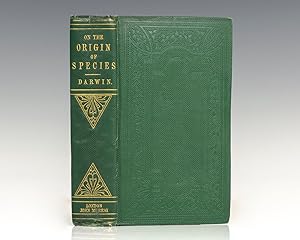
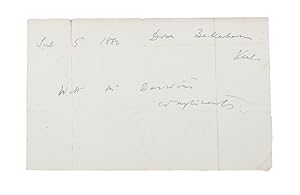
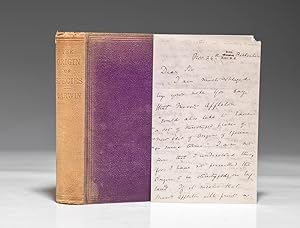
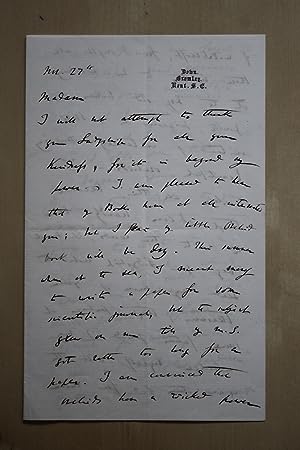
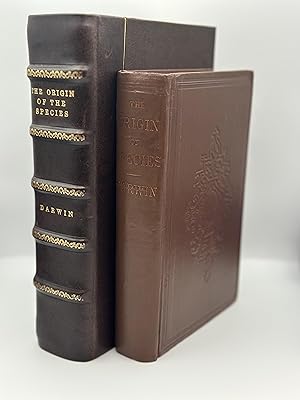
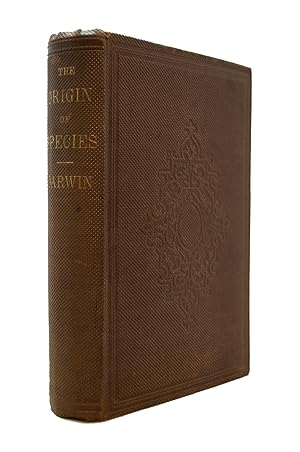
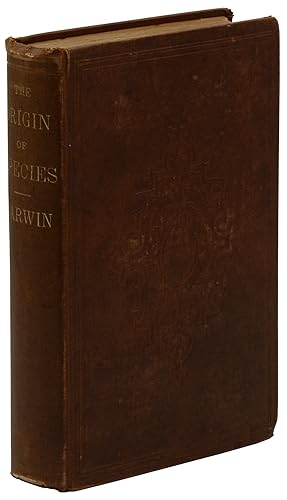
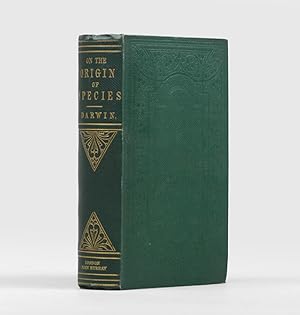
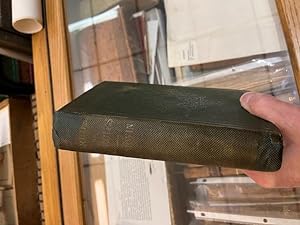
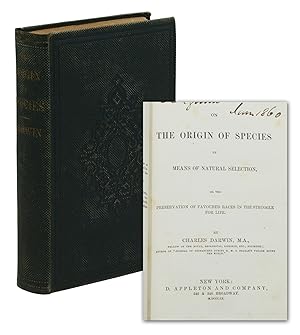
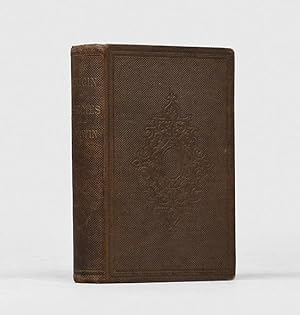
![Seller image for On the Origin of Species by Means of Natural Selection, or the Preservation of Favoured Races in the Struggle for Life. Fifth Thousand. [Second Edition, Second Issue]. BRIGHT, FRESH COPY OF THE SECOND 'ORIGIN' for sale by Island Books](https://pictures.abebooks.com/inventory/md/md16658886175.jpg)
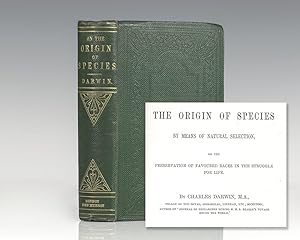

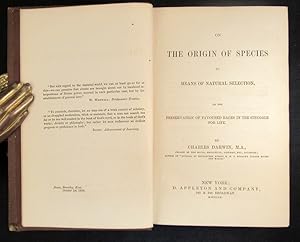
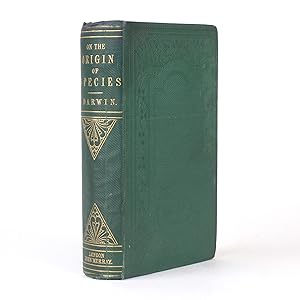
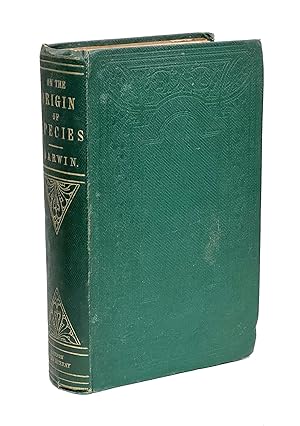
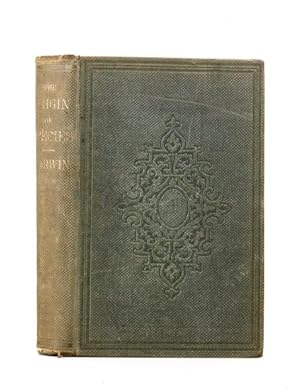
![Seller image for O Proischozhdenii Vodov. [Russian: On the Origin of Species]. Perevel c anglijskago [translated from English by] S.A. Rachinsky. - ["THE MOST IMPORTANT BIOLOGICAL BOOK EVER WRITTEN" (FREEMAN)] for sale by Lynge & Søn ILAB-ABF](https://pictures.abebooks.com/inventory/md/md30095148565.jpg)
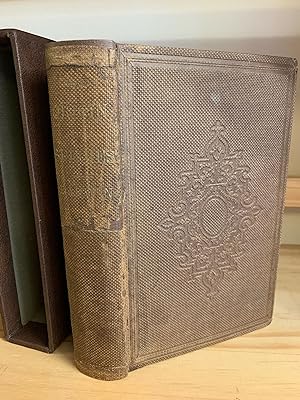
![Seller image for Sull'Origine delle Specie per Elezione Naturale ovvero Conservazione delle Razze perfezionate nella Lotto per L'Esistenza. Prima Traduzione Italiana col Consenso dell' Autore per Cura di G. Canestrini e L. Salimbeni. - [FIRST ITALIAN TRANSLATION OF DARWIN'S "ORIGIN OF SPECIES"] for sale by Lynge & Søn ILAB-ABF](https://pictures.abebooks.com/inventory/md/md30028704452.jpg)
![Seller image for [On The Origin of Species.] A fajok eredete a természeti kiválás útján vagyis az elönyös válfajok fenmaradása a létérti küzdelemben. Irta Charles Darwin. Az eredeti hatodik bövitett s javitott kiadása után fordította Dapsy László. Revideálta Margó Tivadar. I. [II.] kötet for sale by Földvári Books](https://pictures.abebooks.com/inventory/md/md30752094465.jpg)
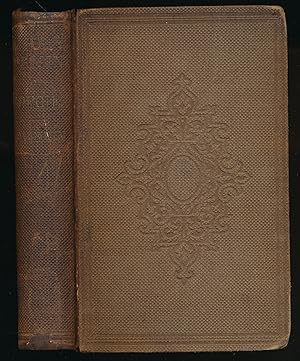
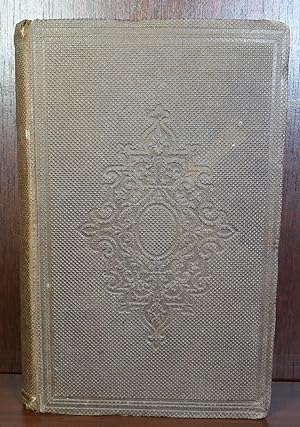
![Seller image for O Proischozhdenii Vodov. [Russian: On the Origin of Species]. Perevel c anglijskago [translated from English by] S.A. Rachinsky. - ["THE MOST IMPORTANT BIOLOGICAL BOOK EVER WRITTEN" (FREEMAN)] for sale by Lynge & Søn ILAB-ABF](https://pictures.abebooks.com/inventory/md/md31775512474.jpg)
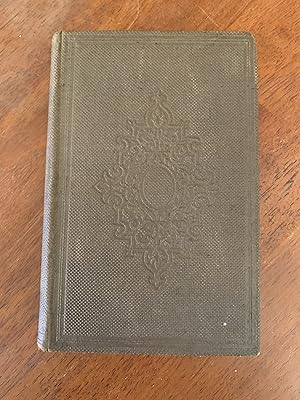
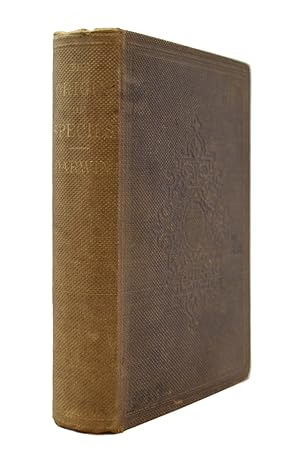
![Seller image for Über die Entstehung der Arten im Thier-und Pflanzen-Reich durch natürliche Züchtung, oder Erhaltung der vervollkommneten Rassen im Kampfe um's Daseyn. Nach der zweiten Auflage mit einer geschichtlichen Vorrede und andern Zusätzen des Verfassers für d. - [FIRST GERMAN TRANSLATION OF "ORIGIN OF SPECIES".] for sale by Lynge & Søn ILAB-ABF](https://pictures.abebooks.com/inventory/md/md14529516159.jpg)